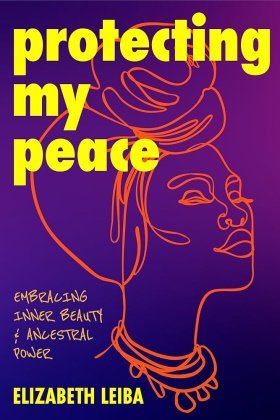ISBN: (pb) 978-1-68481-428-2 (hc) 978-1-68481-429-9 (e) 978-1-68481-430-5
BISAC: HEA012000, HEALTH & FITNESS / Holism
contents 
foreword
chapter 1:
personal journey and realizations
chapter 2:
the plight of Black women
chapter 3:
the prevalence of mental illness in the Black community
chapter 4:
systemic and multifaceted mental health issues in the Black community
chapter 5:
the importance of protecting personal peace
chapter 6:
the influence of societal constructs and personal experiences on perception of beauty
chapter 7:
identity, representation, & consequences of stereotypical portrayals
chapter 8:
foundations of identity and early influences
chapter 9:
the African sacred feminine and historical stereotyping
chapter 10:
reflecting on precolonial societies and their relevance today
protect your peace!
about the author
foreword
With deep personal resonance and great pleasure, I introduce Protecting My Peace by Elizabeth Leiba. In the following pages, you will embark on a journey that promises to be liberating, moving, and educational for anyone who turns the first page.
Workplace trauma resonates deeply with many, and this book directly addresses our collective experiences in corporate settings. This book explores the impacts of workplace trauma while validating the experiences so many of us have had.
As I delved into the manuscript, I was immediately struck by the depth of knowledge, passion, and truth that Elizabeth Leiba brings to the topic of healing from and moving past trauma. This book is a testament to the lived experiences that many of us have endured but haven’t yet learned to navigate.
As a psychological safety consultant, I recognize and spend much time thinking about how workplace trauma shifts our mental health and personal stories. Unfortunately, workplace trauma has been the exchange we have made for a paycheck for over a century. Workplaces worldwide cover their unsafe organizations with phrases like “It’s just start-up culture!” or “It’s about culture fit!” for too long.
We have been asked to trade giant pieces of ourselves, our happiness, and our lives to be considered worthy of a job, a promotion, a title, or simply respect. Too often, organizations offer mere lip service to addressing workplace trauma instead of implementing actionable change.
This book changes everything.
Elizabeth Leiba challenges and reshapes our understanding and approach to workplace trauma. In a world where microaggressions, racism, and harm in the workplace have become normalized, she is unafraid to speak her truth, share her narrative, and provide a road map for individuals to heal from these toxic environments. Her unflinching address of these issues is vital.
One of the most powerful parts of Protecting My Peace is the way in which Leiba effortlessly combines rigorous research with personal narrative. By intertwining her experiences with the broader narrative, she invites us into her world to see how work can shape our experiences and mental health. This book helps to bridge the connection between capitalism, workplace trauma, and their impact on our lived experience. While many of us can relate to the strains workplaces can inflict, there’s a path forward highlighted in these pages.
I immensely admire Elizabeth Leiba’s ability to distill complex topics and data, making them accessible. This book is a testament to her skill in breaking down intricate concepts, making them understandable for experts and novices.
Whether you are looking to heal from workplace trauma or simply create better workplaces, Protecting My Peace promises to engage, educate, and inspire. It is a tribute to the power of Black voices and going after what we deserve in work and life. We all deserve safety, healing, and peace—and not just in our homes.
I invite you to embrace changing the narrative with Elizabeth Leiba. Prepare to be moved, to feel anger, joy, and a whirlwind of emotions.
You deserve a life filled with peace, and this book allows us all to take a collective deep breath and move a step closer to a world where we are empowered to protect our peace.
Madison Butler

























